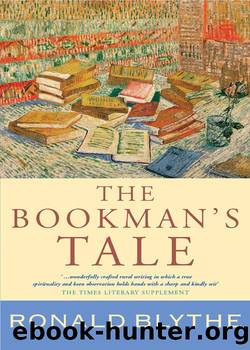The Bookman's Tale by Ronald Blythe

Author:Ronald Blythe [Blythe, Ronald]
Language: eng
Format: epub
Tags: Religion, Christianity, General, Biography & Autobiography, Personal Memoirs
ISBN: 9781848257252
Google: -GqmDwAAQBAJ
Publisher: Canterbury Press
Published: 2009-06-30T23:25:18.420967+00:00
The Ante-room
It is six-something on a summerâs morning, and I am lying on my back listening to Something Understood. The north window is wide to Suffolk, and the east window is wide to Duncanâs hayfield. The bedroom is enormous by todayâs standards, and smells of wax polish, ancient dust, linen, old books, and the double philadelphus that looks in. What is being understood on the radio is death and life, in that order.
Of course, there is no understanding of such a progression without recourse to poets and composers and visionaries generally. Thus I hear for the never-too-often time Charles Causleyâs âEden Rockâ, in which his youthful parents and his far-from-youthful self look across a Cornish stream at the pre-death, pre-life moment. No Bunyan river, frightening and hazardous, no trumpets blaring on the other side. Just the sound of a âTwenties picnic.
Charlesâs father died soon after the First World War, but his mother lived on to a great age. He cared for her after teaching all day, and often wrote his poems in her room. She was an invalid, and not the pretty girl smiling at him across the stream. I would add, âAnd love to your Mother,â when I wrote to him.
Carers were minimal. Charles did it all. And when she at last died he was bereft â which astonished his friends; for what a happy release! People do not understand the varieties of human love and their intensities.
Anyway, I am lying on my back in a room in which babies cried, lovers slept, and quite young folk drew their last breath for centuries, and am thinking what to say at matins. Now they are playing Messiaen; now speaking the mystic language of St John the Divine. All the poets, composers, and philosophers agree that where the death-into-life business is concerned, words and notes fail them. Yet somebody has to express the inexpressible.
Charles Causley, to my mind, does it best. At the Songs of Praise, rambling from hymn to hymn in the flower-filled church, I reached Sabine Baring-Gould, and all owing to Charles. We were on one of his mystery tours, and there at our feet in Lew Trenchard graveyard stretched the author of âNow the day is overâ.
To equal this surprise, I guided Charles to Edward FitzGeraldâs tomb at Boulge, replete with roses from that of Omar Khayyám in Iran. It was midnight and also Charlesâs birthday. The car glittered in the moonlight. We could see to read the inscription, âIt is He that hath made us and not we ourselvesâ. He was, after all, a very odd person â the poet, not his Maker.
On Thursday, I sat with a dying friend. A run of Dick Francis novels above his head, the not discomforting whiff of old tobacco. The garden at the door. The tea on the tray. The dog whipping the furniture with her joyous tail.
There is a moment when we pass, not only beyond the concerns of our day, but into that not unblissful ante-room to what we begin to see but cannot describe.
Download
This site does not store any files on its server. We only index and link to content provided by other sites. Please contact the content providers to delete copyright contents if any and email us, we'll remove relevant links or contents immediately.
Machine Learning at Scale with H2O by Gregory Keys | David Whiting(4314)
Never by Ken Follett(3960)
Fairy Tale by Stephen King(3401)
Reminders of Him: A Novel by Colleen Hoover(3123)
The Man Who Died Twice by Richard Osman(3082)
Will by Will Smith(2924)
It Starts With Us (It Ends with Us #2) by Colleen Hoover(2370)
Rationality by Steven Pinker(2368)
Can't Hurt Me: Master Your Mind and Defy the Odds - Clean Edition by David Goggins(2344)
Friends, Lovers, and the Big Terrible Thing by Matthew Perry(2234)
The Becoming by Nora Roberts(2207)
The Stranger in the Lifeboat by Mitch Albom(2127)
Love on the Brain by Ali Hazelwood(2080)
New Morning Mercies: A Daily Gospel Devotional by Paul David Tripp(1920)
A Short History of War by Jeremy Black(1851)
The Strength In Our Scars by Bianca Sparacino(1847)
HBR's 10 Must Reads 2022 by Harvard Business Review(1847)
A Game of Thrones (The Illustrated Edition) by George R. R. Martin(1751)
Never Finished: Unshackle Your Mind and Win the War Within by David Goggins(1715)
